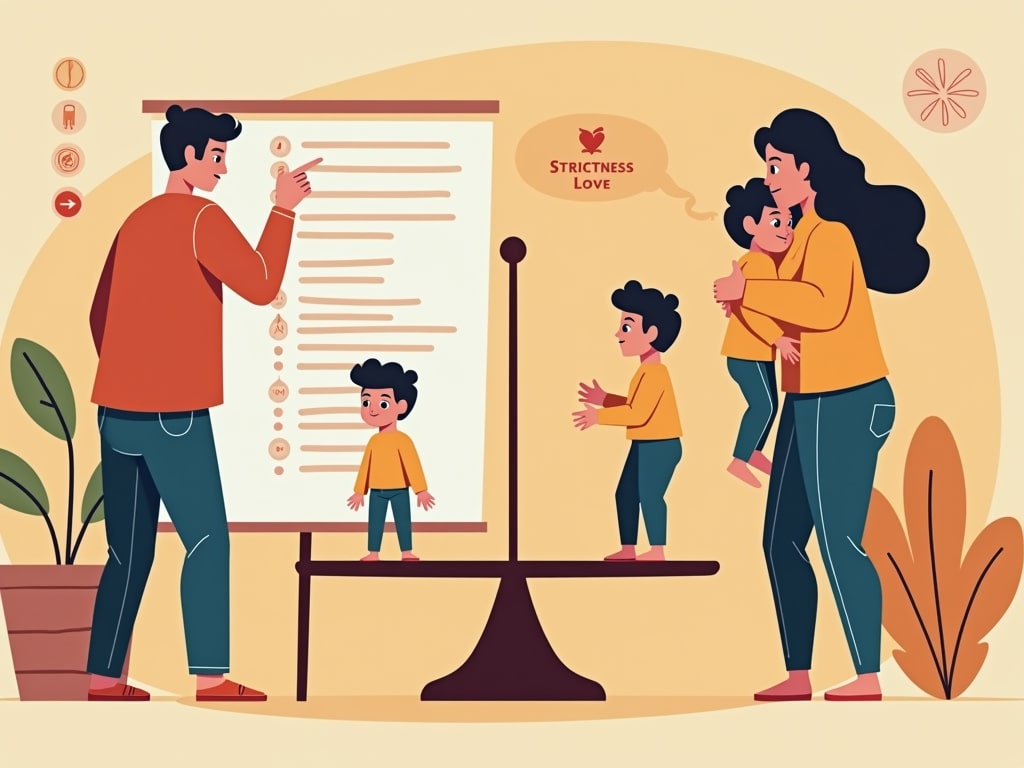
Parent's Guide to Raising
Parenting is a delicate art that requires balancing strictness and love to foster healthy development. This fine line shapes a child’s character, teaching them discipline while ensuring they feel valued and supported. In this guide, we’ll uncover how to navigate this balance effectively and why it is essential for your child’s growth. Let’s explore how healthy discipline and nurturing love work together to empower the next generation.
Why Balance Matters in Parenting
A balance between strictness and love lays the foundation for a child’s emotional well-being and self-discipline. When parents focus solely on discipline, children may feel neglected and undervalued, leading to rebellion or low self-esteem. On the other hand, excessive leniency can hinder a child’s ability to manage challenges effectively, fostering entitlement and lack of accountability.
Key Benefits of Balanced Parenting
- Emotional Security: Children feel safe when boundaries are clear but also enforced with compassion.
- Resilience: Balanced discipline teaches kids to face setbacks and learn from mistakes.
- Independence: Love combined with rules fosters confidence and autonomy.
The core of successful parenting lies in understanding your child’s needs while consistently guiding them toward positive behaviors.
Practicing Healthy Discipline
Discipline is a tool for teaching, not punishing. It instills structure and respect while preparing children to thrive in a world full of expectations and rules.
Strategies for Effective Discipline
- Set Clear Expectations: Children need to know what is expected of them. Communicate rules clearly and ensure they understand the consequences of breaking them.
- Be Consistent: Inconsistency confuses children and undermines authority. Consistently enforce boundaries to reinforce trust.
- Natural Consequences: Allow children to experience the outcomes of their actions. For instance, forgetting homework might result in a lower grade—teaching accountability.
Avoid harsh punishment, as it often leads to resentment rather than learning. Instead, foster mutual respect by focusing on positive reinforcement.
The Role of Love in Nurturing Growth
Love provides the emotional foundation every child needs to flourish. It reassures children that they are valued, regardless of their mistakes, and encourages open communication.
Ways to Show Unconditional Love
- Active Listening: Take time to hear your child’s concerns and validate their feelings without judgment.
- Quality Time: Shared activities strengthen the parent-child bond and build trust.
- Affirmations and Encouragement: Celebrate achievements and support efforts, even when outcomes aren’t perfect.
Balancing discipline with warmth teaches children that while mistakes have consequences, their worth remains intact. This emotional stability is critical for developing self-esteem and resilience.
Blending Strictness and Love: Practical Tips
- Use Positive Language: Frame discipline as guidance. Replace “Don’t do that” with “Here’s a better way to handle this situation.”
- Model Desired Behavior: Children mimic what they see. Demonstrate integrity, patience, and empathy in your actions.
- Tailor Your Approach: Recognize your child’s unique personality. Some children respond better to firm boundaries, while others thrive with gentle encouragement.
- Regular Check-ins: Foster open communication by routinely discussing feelings, challenges, and achievements.
By blending strictness and love, you nurture not only compliance but also a child’s confidence to make wise choices independently.
Common Pitfalls to Avoid
Over-Disciplining
Excessive control can stifle creativity and independence. Instead, prioritize rules that address core values and safety.
Inconsistent Love
Only showing affection during positive behavior may teach children to equate love with performance. Unconditional love builds lasting trust and self-worth.
Ignoring Emotional Needs
Focusing solely on discipline can alienate children. Emotional neglect can lead to anxiety and hinder developmental milestones.
Key Takeaways
- Balance is Essential: Strictness without love fosters resentment, while leniency without structure breeds irresponsibility.
- Healthy Discipline Teaches Life Skills: Children learn accountability, resilience, and self-discipline.
- Love is the Foundation: Emotional security empowers children to thrive socially and academically.
- Consistency is Key: Both discipline and affection must be consistent to be effective.
FAQs
1. How can I discipline without being overly strict?
Focus on teaching rather than punishing. Use natural consequences and maintain open communication to explain the rationale behind rules.
2. What if my child doesn’t respond well to discipline?
Reassess your approach. Consider if the rules are age-appropriate and ensure you’re pairing discipline with encouragement and love.
3. How do I balance love and discipline with multiple children?
Each child may require a different approach. Tailor your methods to suit their individual personalities while maintaining consistent core values.
Balancing strictness and love is a journey that evolves as your child grows. By fostering respect, emotional security, and self-discipline, you are nurturing an independent, empowered individual ready to face the world with confidence.




